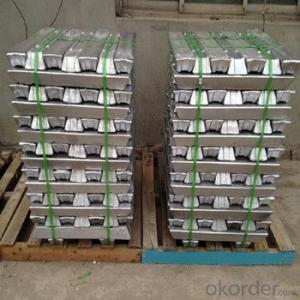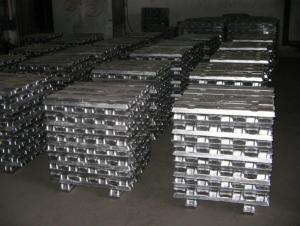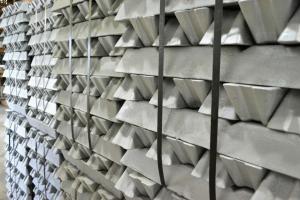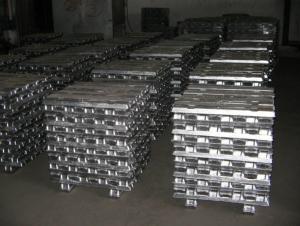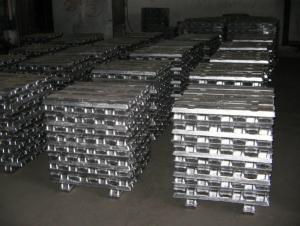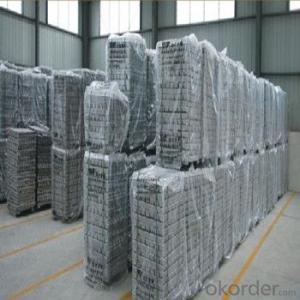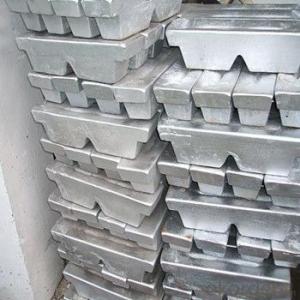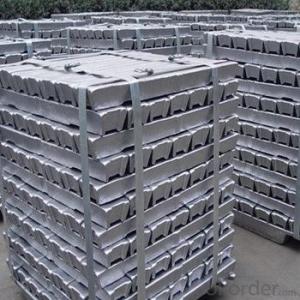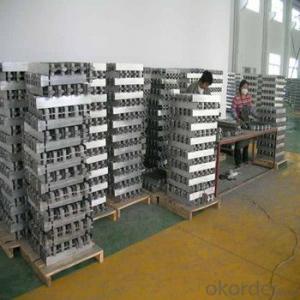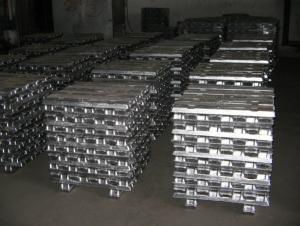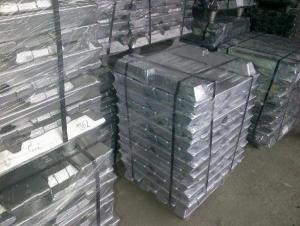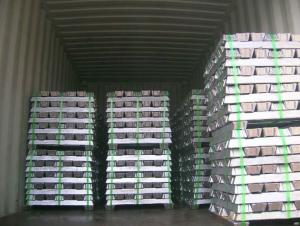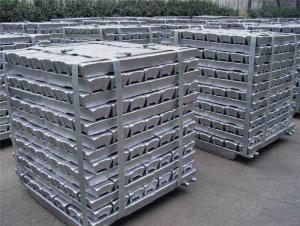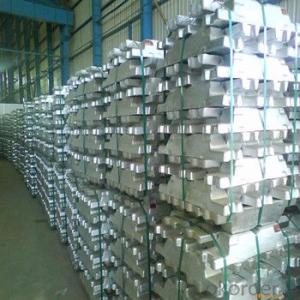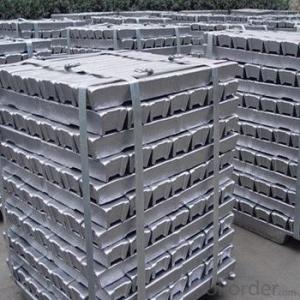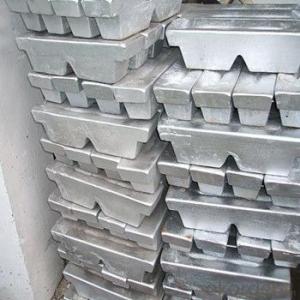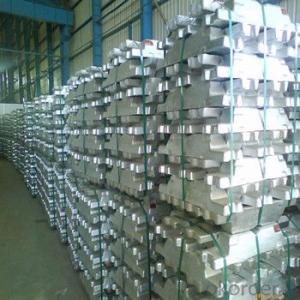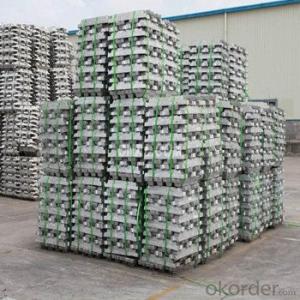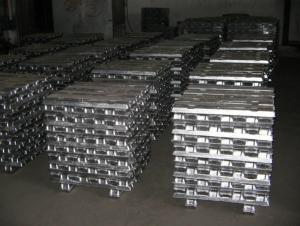Aluminium Ingot from China Hot-Sale with Good Price
- Loading Port:
- China main port
- Payment Terms:
- TT OR LC
- Min Order Qty:
- 1000 m.t.
- Supply Capability:
- 10000 m.t./month
OKorder Service Pledge
OKorder Financial Service
You Might Also Like
Pure Aluminum Ingot Used for Industry
1.Structure of Aluminum Ingot Description
Aluminum Ingot is with the AL as the main chemical composition. Aluminum Ingot is used for industry,such as automobile,pinning and weaving,electron broadly and so on. Aluminum Ingot has the following advantages: easy control and operation, fast melting.
2.Main Features of the Aluminum Ingot
•High Purity
•Easy control and operation
•High strength
•Fast melting
•Competitive price
•Best Service
3. Aluminum Ingot Images
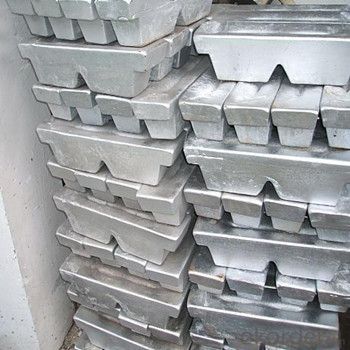
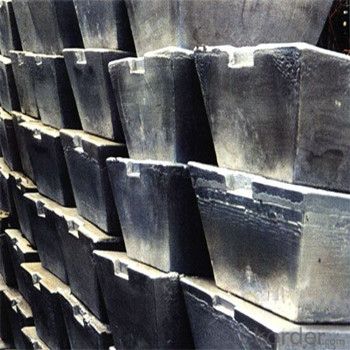
4. Aluminum Ingot Specification
Grade | Chemical Composition % | |||||||||
Al≥ | impurities ≤ | |||||||||
Si | Fe | Cu | Ga | Mg | Zn | Mn | others | Sum | ||
Al99.9 | 99.90 | 0.50 | 0.07 | 0.005 | 0.02 | 0.01 | 0.025 | - | 0.010 | 0.10 |
Al99.85 | 99.85 | 0.80 | 0.12 | 0.005 | 0.03 | 0.02 | 0.030 | - | 0.015 | 0.15 |
Al99.7 | 99.70 | 0.10 | 0.20 | 0.010 | 0.03 | 0.02 | 0.030 | - | 0.030 | 0.30 |
Al99.6 | 99.60 | 0.16 | 0.25 | 0.010 | 0.03 | 0.03 | 0.030 | - | 0.030 | 0.40 |
Al99.5 | 99.50 | 0.22 | 0.30 | 0.020 | 0.03 | 0.05 | 0.050 | - | 0.030 | 0.50 |
Al99.00 | 99.00 | 0.42 | 0.50 | 0.020 | 0.03 | 0.05 | 0.050 | - | 0.050 | 1.00 |
5.FAQ of Aluminum Ingot
We have organized several common questions for our clients,may help you sincerely:
①How about your company?
A world class manufacturer & supplier of castings forging in carbon steel and alloy steel,is one of the large-scale professional investment casting production bases in China,consisting of both casting foundry forging and machining factory. Annually more than 8000 tons Precision casting and forging parts are exported to markets in Europe,America and Japan. OEM casting and forging service available according to customer’s requirements.
②How to guarantee the quality of the products?
We have established the international advanced quality management system,every link from raw material to final product we have strict quality test;We resolutely put an end to unqualified products flowing into the market. At the same time, we will provide necessary follow-up service assurance.
③How long can we receive the product after purchase?
In the purchase of product within three working days, We will arrange the factory delivery as soon as possible. The pecific time of receiving is related to the state and position of customers.Commonly 7 to 10 working days can be served.
- Q:What is the price of aluminum ingots in the market?
- Several factors, including supply and demand dynamics, global economic conditions, and market trends, can cause the price of aluminum ingots in the market to fluctuate. Based on my understanding, the typical price range for aluminum ingots is commonly between $1,800 and $2,200 per metric ton. Nevertheless, it is crucial to acknowledge that these prices are subject to modifications and may differ in various regions or at different periods. To obtain the most precise and current information, it is recommended to seek guidance from dependable sources such as metal industry reports, commodity exchanges, or aluminum sector market analysts.
- Q:Wall aluminum window price
- Aluminum prices look at the price of aluminum ingot market. I wish you a pleasant life.
- Q:What are the advantages of using aluminum ingots in the production of renewable energy systems?
- There are several advantages of using aluminum ingots in the production of renewable energy systems. Firstly, aluminum is a lightweight material, making it easier to transport and install in various renewable energy systems such as solar panels and wind turbines. This lightweight characteristic also reduces the load on supporting structures, leading to cost savings in terms of materials and installation. Secondly, aluminum has excellent corrosion resistance properties, which is crucial for renewable energy systems that are often exposed to harsh environmental conditions. This resistance ensures the longevity and durability of the systems, reducing maintenance and replacement costs. Additionally, aluminum is highly recyclable, with the ability to be reused repeatedly without any loss in quality. This recyclability aspect makes aluminum a sustainable choice for renewable energy systems, aligning with the goal of minimizing environmental impact. Furthermore, aluminum has high thermal conductivity, allowing for efficient heat dissipation in renewable energy systems. This property is particularly beneficial in applications like solar panels, where excess heat can reduce efficiency. By effectively dissipating heat, aluminum ensures optimal performance and extends the lifespan of the system. Moreover, aluminum ingots can be easily molded and customized into various shapes and sizes, enabling manufacturers to design renewable energy systems with enhanced efficiency. This flexibility in design helps optimize the system's performance and adapt to different project requirements. Lastly, aluminum is a cost-effective material compared to alternatives like steel or copper. The relatively low cost of aluminum ingots allows for more affordable production of renewable energy systems, making them more accessible to a wider range of consumers. In conclusion, the advantages of using aluminum ingots in the production of renewable energy systems lie in their lightweight nature, corrosion resistance, recyclability, thermal conductivity, design flexibility, and cost-effectiveness. These qualities contribute to the overall efficiency, durability, and affordability of renewable energy systems, making aluminum a preferred material in the industry.
- Q:What is the average price of an aluminum ingot?
- The average price of an aluminum ingot can vary depending on various factors such as market conditions, supply and demand dynamics, and regional factors. As of [current date], the average price of an aluminum ingot is approximately [average price]. However, it is important to note that this price is subject to change and it is advisable to consult with industry sources or market experts for the most up-to-date and accurate pricing information.
- Q:How are aluminum ingots used in the production of window frames?
- Aluminum ingots are melted down and formed into extruded profiles, which are then cut and assembled to create window frames. The ingots provide the raw material necessary for the manufacturing process and ensure the frames are lightweight, durable, and corrosion-resistant.
- Q:What's the difference between aluminium ingot A380 and ADC12?
- ADC12 material has better flowability than A380, and silicon content is higher than A380. But the mechanical properties of the two materials can be universal. Two types of materials can be mixed, it is recommended to communicate with customers first
- Q:Can aluminum ingots be used in medical applications?
- Yes, aluminum ingots can be used in certain medical applications. Aluminum is lightweight, non-toxic, and has excellent corrosion resistance, making it suitable for medical devices such as orthopedic implants, prosthetics, and surgical instruments. However, it is important to note that aluminum should meet specific medical grade standards to ensure its safety and compatibility with biological systems.
- Q:I would like to ask, aluminum water poured into the mold, what should pay attention to? Aluminum solidification in the mold after the aluminum ingot, how can I get it out?
- When the mould is opened, the hammer is used to mark the template, and the 4 shafts on it strike another template to make it open. Die casting equipment is generally equipped with a die, directly push the sub templates, mold opening.
- Q:How are aluminum ingots used in the production of signage?
- Aluminum ingots play a crucial role in the production of signage due to their lightweight, durability, and versatility. When producing signage, aluminum ingots are melted down and then transformed into various sign components or sheets, depending on the desired design and purpose. One of the main uses of aluminum ingots in signage production is for creating sign frames. These frames provide structural support and stability to the signage, ensuring its longevity and resistance to weather conditions. The lightweight nature of aluminum makes it easier to transport, install, and maintain these sign frames. Additionally, aluminum ingots are often used to create sign panels or sheets. These panels can be cut, drilled, or shaped into various sizes and designs, allowing for customization and creativity in signage production. The durability of aluminum ensures that these panels can withstand outdoor exposure and remain intact for extended periods. Moreover, aluminum ingots are used to produce sign letters or logos. Signage made from aluminum letters provides a professional and sleek appearance that can enhance the overall aesthetic appeal of the signage. By using aluminum ingots, sign manufacturers can create precise and intricate lettering with ease. Furthermore, aluminum ingots offer excellent corrosion resistance, making them suitable for outdoor signage applications. They can withstand harsh weather conditions, UV exposure, and temperature variations without deteriorating or losing their visual appeal. This makes aluminum an ideal material for outdoor signs where durability and longevity are essential. In summary, aluminum ingots are widely used in the production of signage due to their lightweight, durability, and versatility. They are transformed into sign frames, panels, and letters, providing structural support, customization options, and a professional appearance. With their corrosion resistance, aluminum ingots ensure that signage remains intact and visually appealing even in challenging outdoor environments.
- Q:How are aluminum ingots used in the production of automotive parts?
- Aluminum ingots play a crucial role in the production of automotive parts as they serve as the raw material for manufacturing lightweight and durable components. The use of aluminum in the automotive industry has gained significant momentum due to its excellent properties, such as high strength-to-weight ratio, corrosion resistance, and good thermal conductivity. Once aluminum ingots are obtained, they go through a series of manufacturing processes to transform them into automotive parts. First, the ingots are melted in a furnace to create molten aluminum. This molten metal is then poured into a mold or cast to form the desired shape of the automotive part. This casting process allows for the production of complex shapes and intricate designs that would be difficult to achieve with other materials. After the casting process, the newly formed automotive part undergoes additional treatments to enhance its mechanical properties. These treatments can include heat treatment, surface finishing, and machining. Heat treatment helps to improve the material's strength and hardness, while surface finishing processes such as polishing or coating provide a smooth and aesthetically appealing appearance. Machining processes like milling, drilling, and cutting are also performed to achieve precise dimensions and ensure the part's perfect fit in the vehicle. Aluminum ingots are commonly used in the production of various automotive parts, including engine blocks, cylinder heads, pistons, wheels, transmission cases, and structural components. The lightweight nature of aluminum allows for reduced vehicle weight, which in turn enhances fuel efficiency and reduces emissions. Additionally, aluminum's excellent thermal conductivity helps dissipate heat generated by the engine, contributing to improved overall performance and longevity. In summary, aluminum ingots are essential in the production of automotive parts due to their lightweight, durable, and corrosion-resistant properties. The casting, heat treatment, surface finishing, and machining processes transform these ingots into high-quality components that are integral to the automotive industry's pursuit of efficiency, performance, and sustainability.
1. Manufacturer Overview |
|
|---|---|
| Location | |
| Year Established | |
| Annual Output Value | |
| Main Markets | |
| Company Certifications | |
2. Manufacturer Certificates |
|
|---|---|
| a) Certification Name | |
| Range | |
| Reference | |
| Validity Period | |
3. Manufacturer Capability |
|
|---|---|
| a)Trade Capacity | |
| Nearest Port | |
| Export Percentage | |
| No.of Employees in Trade Department | |
| Language Spoken: | |
| b)Factory Information | |
| Factory Size: | |
| No. of Production Lines | |
| Contract Manufacturing | |
| Product Price Range | |
Send your message to us
Aluminium Ingot from China Hot-Sale with Good Price
- Loading Port:
- China main port
- Payment Terms:
- TT OR LC
- Min Order Qty:
- 1000 m.t.
- Supply Capability:
- 10000 m.t./month
OKorder Service Pledge
OKorder Financial Service
Similar products
New products
Hot products
Hot Searches
